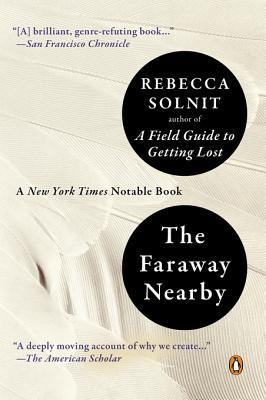
The Faraway Nearby
- اطلاعات
- نقد و بررسی
- دیدگاه کاربران
نقد و بررسی

April 8, 2013
San Francisco social activist and National Book Critics Circle Award–winner Solnit (River of Shadows; A Paradise Built in Hell) fashions an elegant study in empathy through these meandering reflections on subjects as diverse as her mother’s descent into dementia, Che Guevara, and Solnit’s own “magical rescue” to Iceland for some months as resident at the Library of Water museum. Storytelling is Solnit’s way of perceiving the suffering of others, she writes, and her first essays explore the decidedly mixed feelings she harbored toward her difficult mother as she grew more and more forgetful, revealing the dreaded symptoms of Alzheimer’s. The author struggled to honor the “unremembered past” she shared with her often critical, resentful mother. From the rotting apricots gathered from her mother’s yard, Solnit made jam, an act of stalling their inevitable decay—a startlingly moving metaphor for vanitas. Ice is another preserver/destroyer, and Solnit segues nimbly into her explorations in Iceland by way of Mary Shelley’s Frankenstein, which begins and ends on ice, with the polar explorer’s narrative. Throughout, Solnit subtly touches on subject ranging from Guevara’s contact with leprosy patients as he traveled around Latin America in the 1950s to the reach of Buddhism to Icelandic history, to her own health crisis—and all in her enormously fluid style. Agent: Bonnie Nadell, Hill Nadell Literary Agency.

Starred review from April 15, 2013
Solnit (A Paradise Built in Hell, 2010, etc.) considers the nature and purposes of storytelling in a series of elegantly nested meditations. The author begins with 100 pounds of apricots, picked from a tree outside the home her Alzheimer's-stricken mother can no longer safely inhabit. Canning this abundance of perishable fruit to preserve it, Solnit begins to think about the ways in which the stories we tell arrest time; her musings on decay and death gain greater urgency when she learns that she has a potentially cancerous condition that requires surgery. In "Mirrors," she recalls that telling stories was a vehicle for her mother's deeply conflicted views about the past; their relationship was fraught, and Solnit escaped from constant criticisms and resentments into the solace of books. Yet "books are solitudes in which we meet," she insists, repeatedly using the word "empathy" to characterize the essential quality needed to create stories that express our common humanity. Solnit co-opts Georgia O'Keeffe's wonderfully evocative phrase "the faraway nearby" to specify the delicate balance between distance and closeness that enables this process of reaching out through storytelling. She employs a series of chapter titles that serve as both metaphors and precise physical descriptions--"Ice," "Flight," "Breath" and "Wound"--to propel her narrative into the central "Knot." In it, she is operated on, "then sewn shut with thread and knots," prompting her to expatiate on Greek mythology's ancient image of human life as a thread winding through a labyrinth. "Unwound" begins the process of re-using previous chapter titles to give them new meanings as Solnit recuperates in Iceland, and the text moves toward a final consideration of those apricots as "a catalyst that made the chaos of that era come together as a story of sorts." A provocative, moving melange of personal confession and intellectual inquiry--another sui generis work from one of our most stimulating essayists.
COPYRIGHT(2013) Kirkus Reviews, ALL RIGHTS RESERVED.

June 1, 2013
The catalyst for the latest spiraling inquiry by Lannan Literary Awardwinning creative nonfiction master Solnit is her mother's Alzheimer's. Solnit considers memory and its mutations, contemplates the harvest of a backyard apricot tree, and celebrates the pleasures and revelations of reading and writing You have an intimacy with the far away and distance from the near at hand. Drawing on intrepid research, she analyzes with verve and exceptional fluency in metaphor the pivotal roles stories play in our private and social lives, pondering the infinite resonance of fairy tales and Mary Shelley's Frankenstein. Working with a sequence of repeating motifsapricots, mirrors, ice, flight, breath, wound, knotSolnit chronicles her residency in Iceland at the Library of Water and offers surprising and stirring observations about chemical pollution and polar bears, Dutch still lifes and Che Guevara, symbiosis and butterflies, the mesmerizing art of spinning and Buddhism, and her own alarming medical adventure. Solnit's ensouling facility with language and profound perception of physical and psychic geography shape her complexly evocative musings on how we extract meaning from inheritance, feeling, place, and experience.(Reprinted with permission of Booklist, copyright 2013, American Library Association.)

January 1, 2013
National Book Critics Circle Award winner Solnit reveals storytelling as an exercise in empathy. Smart readers shouldn't miss.
Copyright 2013 Library Journal, LLC Used with permission.




دیدگاه کاربران